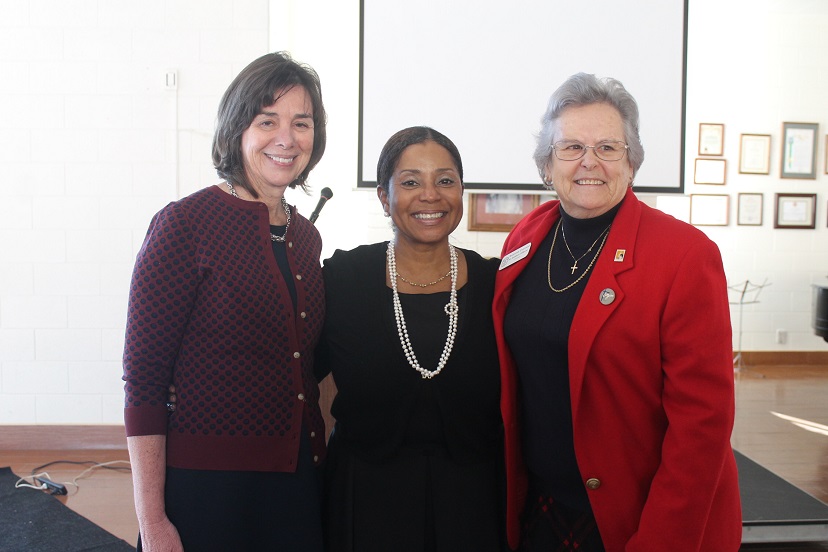During her recent visit to speak at the Women’s Leadership Symposium and with the young women of Ramona Convent, Donzaleigh Abernathy uttered a single sentence to begin her presentation that caught the attention of all who were present: “America is a beautiful place because we empower women. Women have to tell their stories.”
As she continued to speak, it became clear just how accomplished she is and how her collection of personal stories would touch the lives of all in attendance, including students from Ramona Convent, San Gabriel Mission, Pomona Catholic, and Cantwell Sacred Heart of Mary High Schools. The daughter of influential civil rights leader, Reverend Ralph David Abernathy, Ms. Abernathy grew up in the midst of historical change. Her world was framed between two conflicting viewpoints: that of society segregating African Americans from everyday life and that of the civil rights activists that fought for racial equality. Like her father and family friend Dr. Martin Luther King, Jr., she stood up in the fight against racism that characterized that divide, a lesser-known figure in the movement students now read about in textbooks.
The inclusion of those forgotten by history was at the forefront of Ms. Abernathy’s presentation. Although the talk centered on the work of and relationship between her father and Dr. King, women were given the greatest appraisal as the foundation for many of the civil rights marches and protests. Though these women are often ignored by dominant histories, Ms. Abernathy presented picture after picture of women who are holding signs and marching along city streets and shared how “women were the facilitators of change.”
She continued the theme of empowerment and inclusion by presenting pictures of lesser-known civil rights activists and individuals that most students may never learn about, such as the four girls who died in a church bathroom when a bomb exploded, two women who were arrested for refusing to change seats in a public bus before Rosa Parks did so, and the woman murdered by members of the Ku Klux Klan for driving a black man from Montgomery to Selma to vote. Ms. Abernathy acknowledged their contributions in the hopes that her audience would understand how one person can make a difference. History teaches us about the “great men” who led these movements and inspired people to fight for change, yet it often forgets to recognize those who fought alongside those men and suffered for the same cause. All individuals who participated in the civil rights movement should be praised for their efforts, and Abernathy accomplishes her part by educating others about them.
Some of Abernathy’s audience were born decades after the civil rights movement, witnessing only the changes it produced within our government and society. Yet, every single person left the presentation with an understanding that racial equality has not been resolved. Abernathy’s greatest strength proved to be her ability to connect with her audience through current events, reminding them that today’s political world is as concerned about racism as ever.
Abernathy could have discussed only the lives of her father and Martin Luther King Jr., but that would have undermined the whole message of the civil rights movement: Racism is a social issue that will continue unless people are willing to discuss and recognize it. For Abernathy, following in the footsteps of her father, that meant that she would discuss racism through her own powerful nonviolent action: education. Abernathy was educated by her parents to recognize her rights as an American citizen. She continues this legacy by educating younger generations about their own rights as citizens, calling upon them, too, to fight against racial inequality.
Certainly, the task is great. If we can believe, like Ms. Abernathy, that great change comes from incremental steps, then we all have a role to play in our better future. Surely these significant events will be more than another chapter in a history book for the Ramona community.
Ramona is a welcoming Catholic college-prep high school for girls in grades 9-12. Ramona graduates face the future with an extraordinary education, a global vision fueled by Catholic values, an independent spirit, confident leadership skills, the support of their Ramona sisters, and the strength of a legacy of more than 125 years of excellence.
Ramona Convent Secondary School, 1701 W. Ramona Rd., Alhambra, (626) 282-4151 or visit www.ramonaconvent.org.















